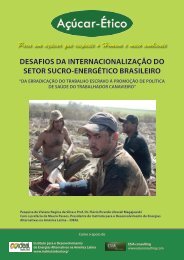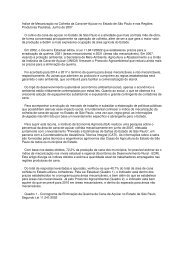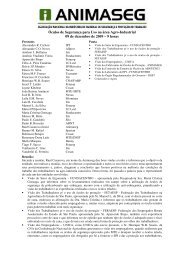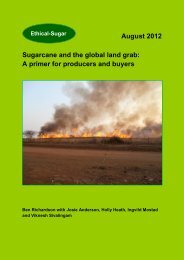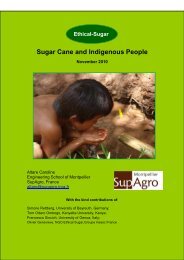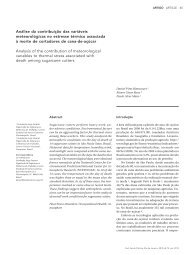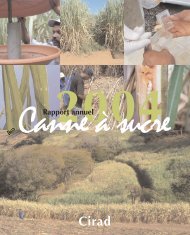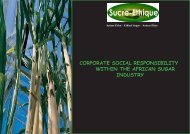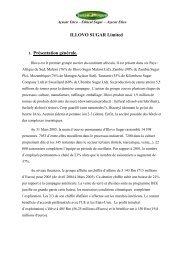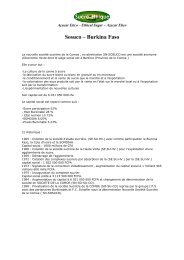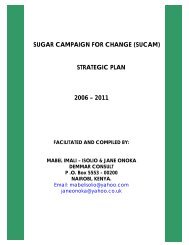Social Report 2010 â India - Sucre Ethique
Social Report 2010 â India - Sucre Ethique
Social Report 2010 â India - Sucre Ethique
You also want an ePaper? Increase the reach of your titles
YUMPU automatically turns print PDFs into web optimized ePapers that Google loves.
16<br />
Detailed information<br />
Camp Location :<br />
Near Dhodansa, Vaghnera, Tansadabar camps under Bardoli Sugar Factory, taluka Mandvi, District<br />
Surat, Gujarat, <strong>India</strong><br />
Name of victim: Mr. Manilal, age 34, Ms. Shilaben, age 28, and many other adivasis employed by<br />
the Bardoli Sugar Factory.<br />
Case details :<br />
The Bardoli Sugar Factory, under the Co-operative Societies Act, is governed by the Registrar and<br />
provides living accommodations for its adivasi workers. Mr. Manilal and Ms. Shilaben are both<br />
adivasis contracted to work under the Bardoli Sugar Factory. Both are landless and live in camps<br />
provided by their cooperative society employers. Traditionally, they are basket weavers by profession<br />
however, in order to earn enough to live, both became sugarcane cutters. Mr. Manilal states,<br />
"Otherwise my family members and I would die of starvation".<br />
The living conditions in the camps where the sugarcane cutters live are horrendous. Water is the<br />
primary concern in the camps. Water is so scarce that sometimes even drinking water is not available.<br />
Bathing is seldom heard of and the women must bring their clothing to their worksite in<br />
order to wash them. Toileting is also a great concern and as the camps are crowded with men,<br />
women and children, there is no privacy for this basic function.<br />
Moreover, the camps are extremely filthy and riddled with mosquitoes, flies and other insects. Ms.<br />
Shilaben laments, "because the camp lies next to an open gutter, we are surrounded by poisonous<br />
insects and get bitten frequently". She further explains that the shelters provided by their employers<br />
merely consist of a few sticks and a tarpaulin. One cannot stand in their shelters and often<br />
times, dogs and cattle from the area join them in their homes.<br />
The food provided at the campsite mainly consists of grains such as wheat, rice, juvar (cream colored<br />
grains) and pulses. However, often times, the foodstuff is spoiled, and is dirty, full of stones,<br />
broken or infested with worms. If the food is not cleaned and cooked properly the families fall ill.<br />
Frequently however, cooking is not possible as firewood can be scarce.<br />
As adivasis, or scheduled tribes, the sugarcane cutters experience much discrimination against<br />
them. Often, the cutters are called dirty and lazy by upper caste villagers. Further, though the<br />
High court order is to pay Rs. 108/- per Koiyat (pair of workers), it is not followed. The mukardam<br />
(middleman who contracts the adivasis to the factory) pays much less to the people. Additionally,<br />
while the mukardam keeps detailed work records, he will not release them or provide evidence of<br />
due pay.<br />
<strong>Social</strong> <strong>Report</strong> <strong>2010</strong><br />
-<br />
ETHICAL-SUGAR




